Published on
How to Bake Moist Cakes From Scratch
Today I’m sharing my tips for how to bake moist cakes from scratch – every time!
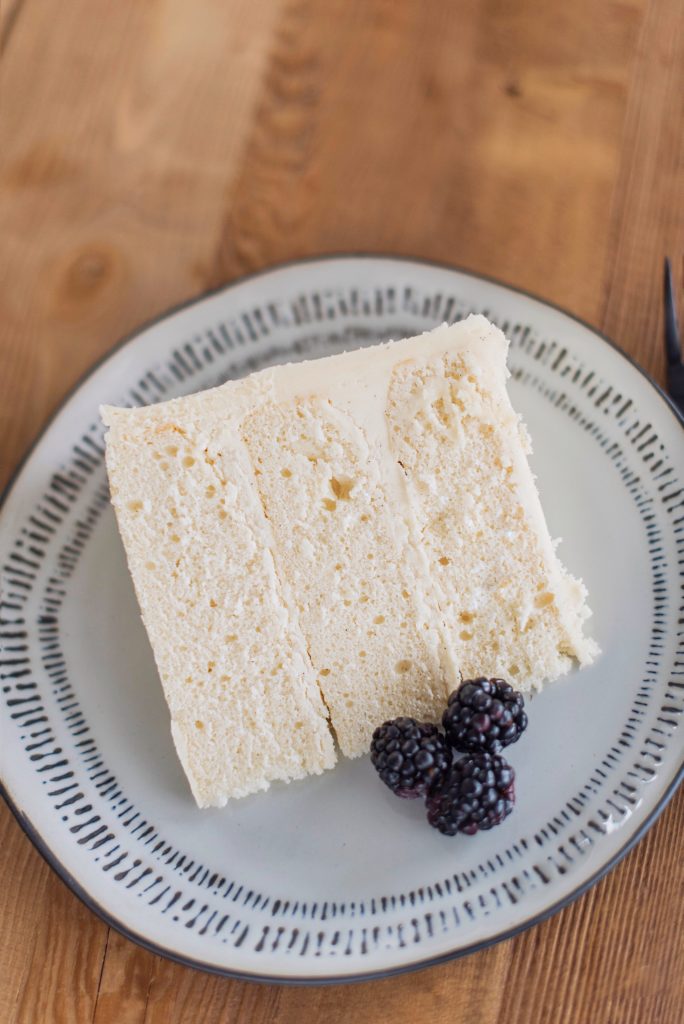
How to Bake Moist Cakes From Scratch
It’s probably one of the most frequently asked questions in baking. How do I bake moist cakes from scratch?
It seems like it would be simple, right? Follow a recipe and get a moist cake. Unfortunately, it’s not always that easy. Sometimes, we are unaware of how certain substitutions, incorrect measuring, different ovens, how we mix the batter, etc. can affect how our cakes bake.
So today, I thought I’d share with you some things I’ve learned in my baking journey that help to create moist cakes. Hopefully, you learn something that ends up being a game changer to the way you make your cakes so that you always bake moist cakes from scratch from here on out!
Use Real Butter
I’m usually not very picky about what brand of butter you use in a cake. But, using butter, not margarine is hugely important and impactful on the texture of your cake. Did you know margarine has more water content than butter. It’s also made from plant oils, whereas, butter is made from dairy and rich in saturated fats. That fat helps create moisture in our cakes. So when you’re at the store, make sure you reach for butter (I always use unsalted), not margarine.
Measure Flour Correctly
Did you know there’s a right way and a wrong way to measure flour (as well as all dry ingredients)? The most accurate way to measure dry ingredients is with a scale. However, if you don’t have a scale, the next most accurate way to measure flour is as follows:
- Fluff your flour with a spoon.
- Use that spoon to lightly add flour into your measuring cup.
- Carefully and gently level the flour with a knife.
What you don’t want to do is scoop flour with your measuring cup and/or shake the measuring cup to level the amount. When you do either of these, you end up with far more flour in your measuring cup than you’re supposed to have. In fact, I once tested it out to see just how much extra flour you end up with when you scoop and shake. I measured 3 cups of all-purpose flour with the scoop and shake method. I then weighed the amount I measured. It was a full ¼ cup MORE flour than I was supposed to have in my cake batter. That ¼ cup of extra flour will totally change the texture of your cake – most likely causing it to be dry and/or dense.
Add Fat
If you’re often finding that your cakes with only egg whites are coming out dry, it’s likely that you need more fat in the recipe. When we don’t use the yolk, we lose that added fat that helps to create moisture. It’s totally possible to bake moist cakes with just egg whites, but you definitely need to keep your eye on the bake time and likely reduce the temperature (we’ll talk more about that in a minute).
The other trick I like to use with cakes that have only egg whites, is to add sour cream to the recipe. Sour cream is a great fat ingredient that will add moisture to your cake without changing the flavor or color (i.e. if you’re trying to make a white cake). You’ll see that I’ve started adding sour cream to some of my recent recipes, like my Classic Vanilla Cake.
You can add a tablespoon of sour cream for every egg white, or if you’re like me, just throw in a ½ cup, and see how sour cream will be your new best baking friend.
Watch the Bake Time and Temp
I know this may sound obvious to some, but it’s worth going over because it’s an easy fix. If your cakes are coming out dry, it could be that you’re over baking them. Remember, when you insert a toothpick into the center of your cake to check “doneness,” you want the toothpick to come out with a few moist crumbs on it. Your cake layers continue to bake for a few minutes as they cool in the cake pans.
Another alternative to making sure you bake moist cakes from scratch is turning down your oven temperature. While you and I may have the exact same oven, that doesn’t mean they bake the same way. You really have to get to know your oven and be mindful of how long your cakes bake in comparison to a recommended time in a recipe. If you’re watching your cakes bake at a given temperature and time and they’re always coming out dry, I’d suggest reducing your temperature to 325 and baking a few minutes longer. Start with 5 to 7 minutes more and work your way up, if needed, by 2 minute intervals.
Use Light Colored Cake Pans
The color of your pans also makes a difference in how your cakes are baking. If you’re using dark colored pans, you’re likely going to get dark, dry edges because a dark pan heats up quicker as your cake is baking. I always suggest using Fat Daddio pans. This brand specializes in making light colored pans that distribute heat evenly.
Mix on Low Speed
Did you know that over-mixing your cake batter can create a dry, dense cake that doesn’t rise? Sure does! When you start adding your dry ingredients to your wet ingredients, mix on low just until the dry ingredients are incorporated. Stop the mixer and scrape down the sides and bottom of your bowl, and then mix again for another 20 to 30 seconds.
Serve Your Cake at Room Temperature
Yes, I said it and I know it’s controversial 😉
I know many of you like cold cake, and if you do, then keep eating cold cake and enjoy! However, if you’re serving your cake cold, just remember that the texture of the cake layers and buttercream will be different than when you serve cake at room temperature. I think sometimes we associate cold cake with dry cake, when in fact, the cake isn’t actually dry and just needs to be left at room temperature for a little longer.
Store Cake in the Freezer not the Fridge
One of the reasons your cake may end up dry is due to how you store the cake if you’re not serving it right away. Storing your cake in the fridge for a night is definitely ok. Just make sure it’s covered really well (i.e. in a cake carrier or box), so that the air doesn’t dry it out. If you need to store your cake for longer than a night, the freezer is a better option.
You can head HERE to read my blog post about freezing, thawing and transporting your cakes.
Alright, there you have it! Lots of tips for making sure you bake moist cakes from scratch every time!

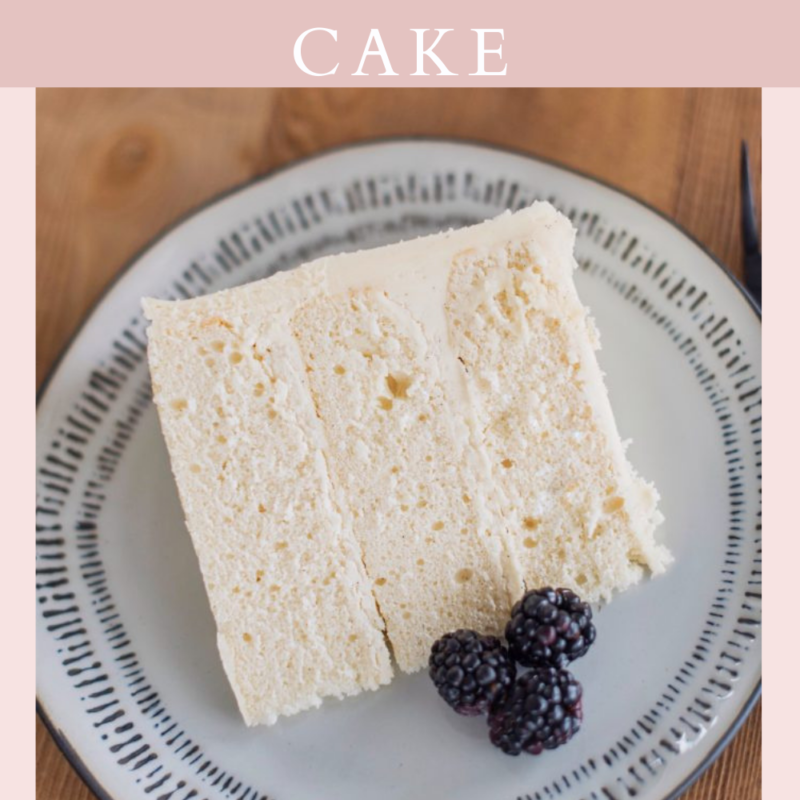
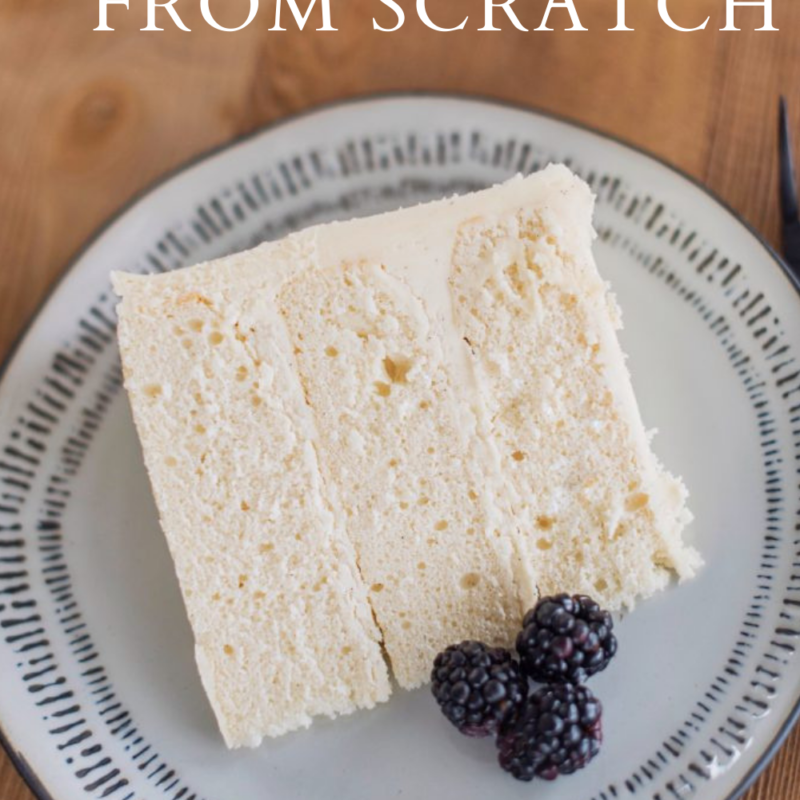
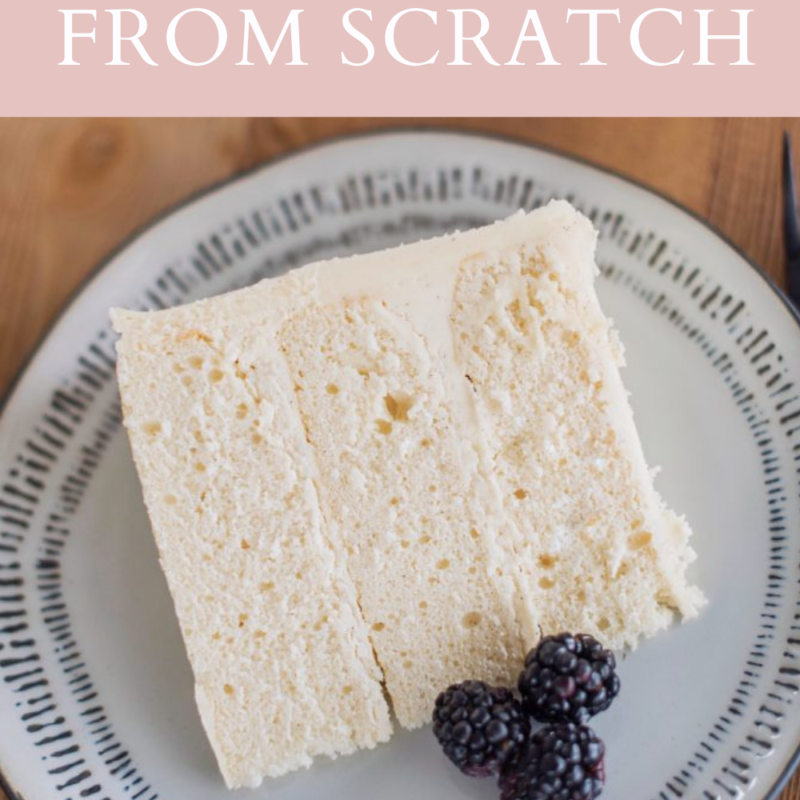
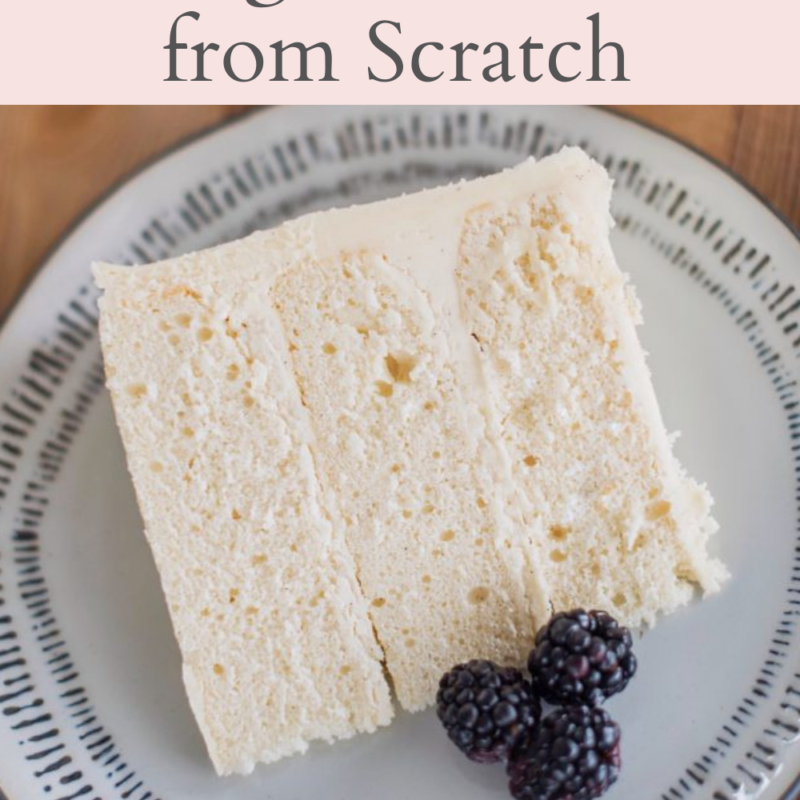
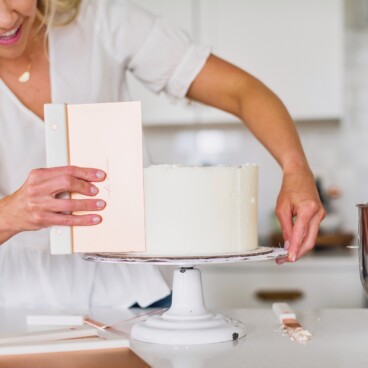
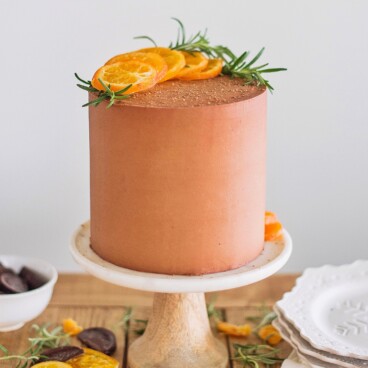
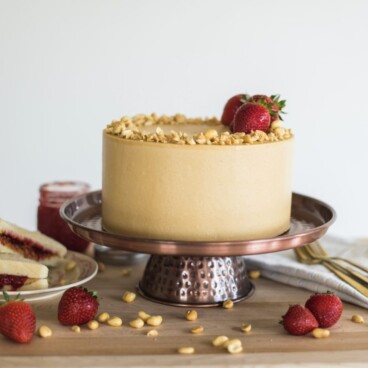
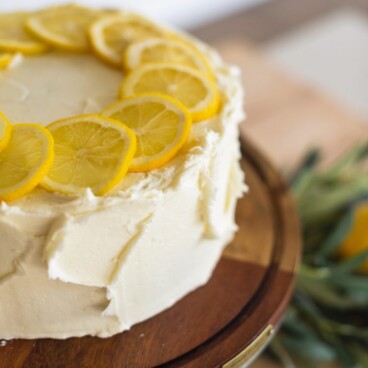
I’m so happy to have found this page. I was scheduled to be in Utah for your April 2nd course and needed to cancel. I’m looking forward to this online learning for the weeks ahead. My neighbors and friends are going to be overjoyed too!
We can’t wait to see you once you reschedule!
Hi Courtney! I have followed your tips in this post and I’m still coming up with dense/dry layers. I have the fat daddio pans (6″ and 8″), I got an oven thermometer, I use a scale to measure, I use Kirkland unsalted butter, large eggs, let it all come to room temp. I live in FL and my kitchen tends towards warm – could my ingredients be too warm to start with? And would that have an effect? Also, I have a 5qt Kitchenaid – it takes me a long time to spoon the flour in without it flying out of the bowl. Do you think this is overmixing and that’s making my cakes dense? I have made Classic vanilla cake twice, Churro cake, and Peanut butter cake and they taste super good(!) but the texture isn’t right. I have made the dark chocolate cake (from the cookies and cream cake recipe) with excellent results in taste and texture – but it’s an oil based cake not butter…
I have had the best time learning from your online class, videos and recipes!
Turn your oven down to 325 and watch the layers. Might take a few more minutes but make sure you are taking your cake out when there are a few moist crumbs on the toothpick. If the toothpick comes out without any crumbs, it cooked too long.
Hi thank you for sharing your tips. I have a question. I only have one round cake pan. Is it ok to bake one at a time leaving the rest of the batter on the counter, or should I bake the batter together and then just cut the layers after it bakes? I’m making your classic white vanilla cake right now.
It’s ok to do it one at a time!
Hi. I saw a video on right this minute on tv, so I looked you up on line. I read your tips on moist cake. I was excited there might be the white cake recipe at the end, but there wasn’t. Do you give that out. If not I understand. I do love your website!!!
Thank you, Nicolette
yes just search my site for white cake!
Courtney, I just discovered your website! I’m so excited! I’m going to bake my way through the whole thing!
I love this! Please tell me your favorites!
Hi,
Can’t figure out how to contact you so trying this. I ordered your bundle (beginners and next level) yesterday 5/3/2022 and have not received any information about it. Will you please help me with this? Thank you!
Can you email [email protected] and we can get that fixed for you!
Thank you for the tips. I am an avid cookie baker and just getting in to doing more cupcakes. What are your thoughts on using oil instead of butter? It seems like cake recipes with oil are more moist. I haven’t tried using sour cream but will definitely do so.
I think oil is a good idea sometimes. Or something you can add in addition to butter. I like butter because of the fat and the texture it creates. Oil adds good fat which helps with moisture but I don’t always love the texture. IF you look at my yellow cake, I add a little oil to that cake that has butter and it bakes beautifully.
Just want to say thanks. Only starting to bake now and you’re really helping to make it a lot easier.
What are your thoughts on using simple syrup to your cakes to help them stay moist? If you do use it, when do you put it on the cake (right after it comes out of oven/before decorating)?
I find I have nice moist cakes when I cut off the little mounds before stacking and decorating, but then after the 15 mins in the freezer for crumb coat, and another 15 mins in the freezer for the outer layer of buttercream to set before taking off the cake disk (and any additional time between decorating and eating) by the time I cut into the cake to eat it, it is bone dry again! Could the freezer be drying out the cake, or is that just in my head?;) Any ideas?
I don’t use simple syrup but you can if you want!
Just wanted to say thank you for all of your tips and advice, and you are hope for us all.
Thanks for sharing this tricks to keep cake moist, I will put them to practice for my daughter’s birthday this week.
Hi Courtney! I live at high altitude, and so many of the recommendations for high altitude baking say to increase the oven temp. Do you think the lower temp will make my cakes/cupcakes sink in the middle? Thank you so much!!
I live at about 5000 feet and lowering my temp to 325 F has actually helped. I found that if a recipe has too much sugar in it, the cake sinks while baking. If you have a recipe you love that tends to sink at your altitude, you could reduce the sugar by about 2-3 tablespoons and add that same amount in flour.